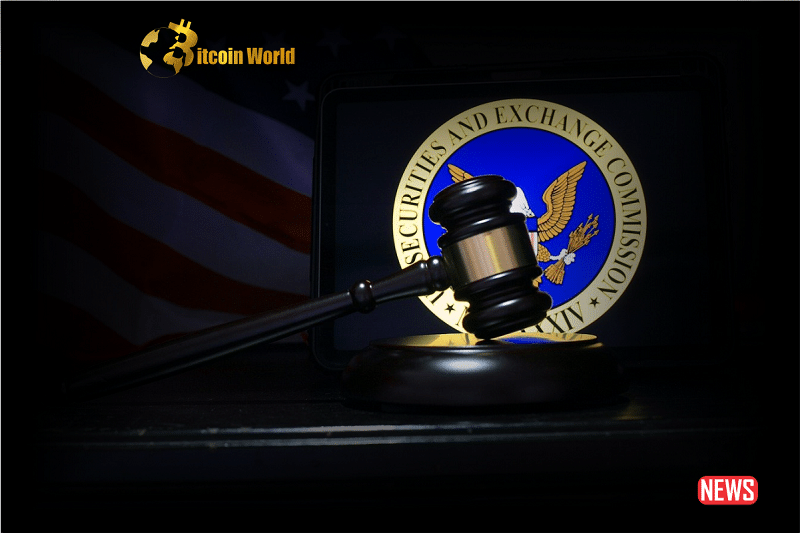The NFT world just got a serious reality check. The U.S. Securities and Exchange Commission (SEC) has thrown down the gauntlet, charging Los Angeles-based media and entertainment company, Impact Theory, LLC. What’s the charge? Selling NFTs that the SEC considers unregistered crypto asset securities. This move, involving a cool $30 million in NFT sales, has sent ripples through the digital collectibles space, raising crucial questions about the future of NFT regulation.
What Exactly Happened?
The SEC alleges that Impact Theory essentially promised buyers that their NFTs would appreciate in value, framing them as investment opportunities. This, according to the SEC, makes these NFTs fall under the umbrella of securities. Think of it like this: if you’re selling something with the explicit promise of profit based on your efforts, regulators might take notice.
A House Divided: Dissent within the SEC
However, this isn’t a story of unanimous agreement. SEC Commissioners Hester M. Peirce and Mark T. Uyeda strongly disagreed with the majority decision. Their dissenting statement raises some critical points about the SEC’s approach to this relatively new asset class.
Why the Dissent? Key Arguments:
- Hype vs. Securities Law: Peirce and Uyeda argue that the buzz and investment surrounding NFTs don’t automatically make them securities. Just because something is popular doesn’t mean it falls under SEC jurisdiction.
- Vague Promises vs. Investment Contracts: They question whether Impact Theory’s promises truly constitute an investment contract under existing securities law. They draw an analogy to selling tangible goods like watches or paintings, where vague promises of brand building aren’t typically seen as securities offerings.
- The Buyback Offer: Impact Theory offered to buy back the NFTs for a significant sum (nearly $7.7 million in Ether). Peirce and Uyeda believe this should have been sufficient to address any potential issues.
Where Was the Guidance? A Call for Clarity
Perhaps the most significant point of contention is the SEC’s perceived lack of clear guidance for the NFT community. Peirce and Uyeda suggest the SEC should have provided clearer rules of the road before resorting to enforcement actions. This begs the question: Should the SEC have offered more clarity before taking action?
Key Questions Raised by the Dissenting Commissioners:
- How should different categories of NFTs be treated?
- Where do NFTs intersect with existing securities regulations?
- Is a securities law framework even the best approach for regulating NFTs?
The NFT Destruction Clause: A Concerning Precedent?
One of the most eyebrow-raising aspects of the settlement is the requirement for Impact Theory to destroy the NFTs and eliminate any future royalties. What are the implications of forcing the destruction of digital assets?
Potential Concerns:
- Impact on Unique Creations: This could set a precedent with significant implications for NFTs representing unique artistic or musical works. Imagine a one-of-a-kind digital artwork being forced into digital oblivion.
- Chilling Effect on Creators: This kind of stipulation could create anxiety and uncertainty among NFT creators and the broader crypto community.
What Does This Mean for the Future of NFTs?
The Impact Theory case serves as a major inflection point for the NFT market. It highlights the ongoing debate about how these digital assets should be regulated and the role of the SEC in this evolving landscape. Will this case lead to clearer regulatory frameworks, or will it stifle innovation in the NFT space?
Potential Outcomes and Considerations:
- Increased Scrutiny: Expect greater SEC scrutiny of NFT projects, particularly those that explicitly promise financial returns.
- Need for Clearer Definitions: The industry needs more precise definitions of what constitutes a security in the context of NFTs.
- Impact on Market Dynamics: This case could influence how NFTs are marketed and sold in the future.
- Importance of Legal Compliance: NFT creators and sellers need to be acutely aware of potential securities law implications.
Actionable Insights for the NFT Community
- Seek Legal Counsel: If you’re creating or selling NFTs, especially with any promise of future value or profit, consult with legal professionals to understand the regulatory landscape.
- Transparency is Key: Be transparent about the nature of your NFTs and avoid making explicit promises of financial returns based on your efforts.
- Stay Informed: Keep up-to-date with the latest regulatory developments and discussions surrounding NFTs.
In Conclusion: A Turning Point for NFTs
The SEC’s action against Impact Theory, coupled with the dissenting opinions within the Commission, underscores the complex and evolving relationship between regulation and the world of NFTs. This case is a stark reminder that while the NFT market offers exciting possibilities, it also operates within a legal framework that is still being defined. The questions raised by Commissioners Peirce and Uyeda about the SEC’s approach and the need for clearer guidance will undoubtedly shape the future trajectory of NFT regulation. As the dust settles, the crypto community, NFT creators, and investors alike will be watching closely to see how the SEC addresses these critical challenges and what it means for the long-term viability and innovation within this dynamic digital asset class.
Disclaimer: The information provided is not trading advice, Bitcoinworld.co.in holds no liability for any investments made based on the information provided on this page. We strongly recommend independent research and/or consultation with a qualified professional before making any investment decisions.




